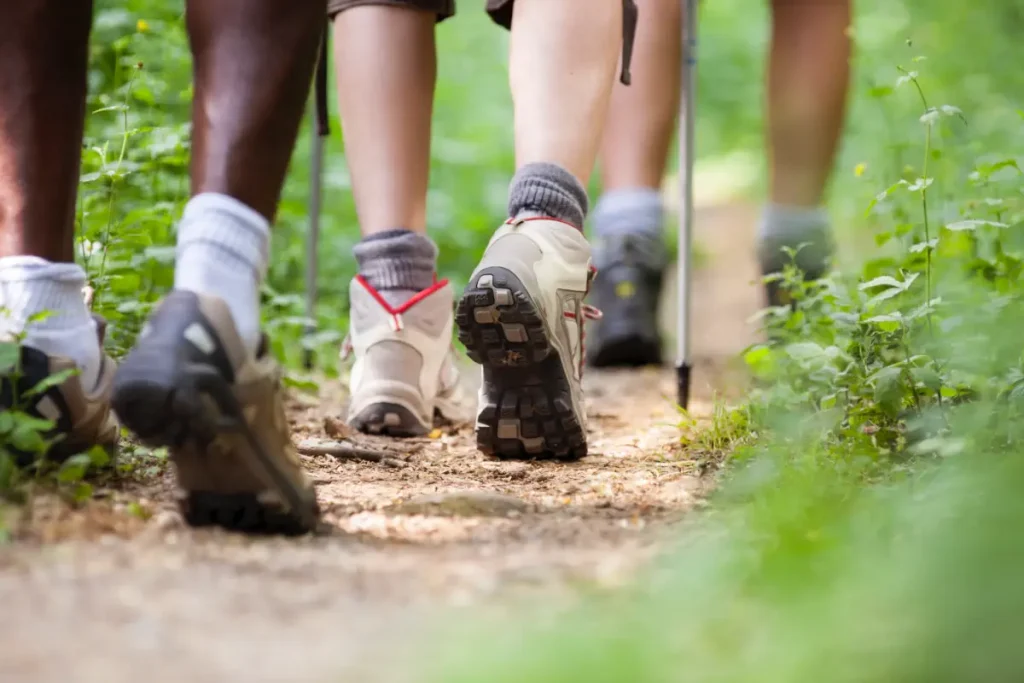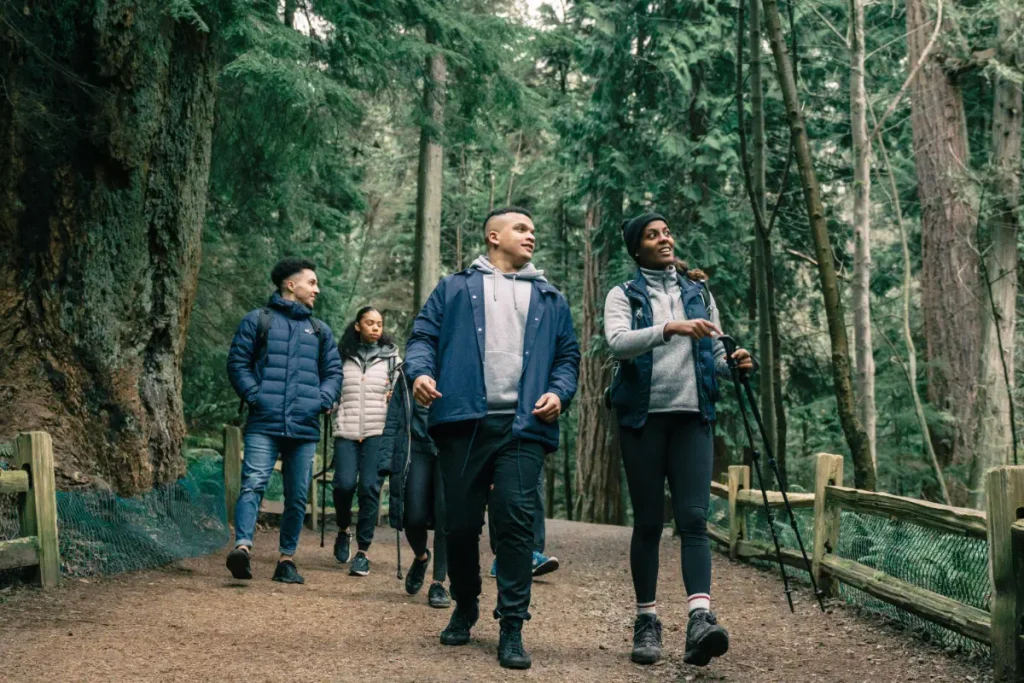Hiking is more than just a leisurely stroll through nature; it’s an invigorating exercise that combines the beauty of the outdoors with physical activity. This blend not only enhances your physical well-being but also elevates your mental health. Whether you’re a seasoned hiker or a novice, understanding how hiking can be a cornerstone of fitness is essential. See my additional article: Hiking For Beginners.

The Health Benefits of Hiking
Physical Health Benefits
Hiking is an all-encompassing workout. It targets various muscle groups, improves cardiovascular health, and boosts endurance. Unlike the monotonous routine of a gym, hiking trails offer varying terrains and difficulties, making it a dynamic and engaging form of exercise.
Cardiovascular Improvement: Regular hiking increases heart rate, which in turn strengthens the heart, reduces the risk of heart disease, and improves blood pressure and blood sugar levels. The varied terrain of hiking trails provides a natural form of interval training, which is excellent for cardiovascular health.
Muscle Strengthening and Toning: Hiking is a powerful workout for several muscle groups, particularly the quadriceps, hamstrings, glutes, and calves. The uneven terrain and inclines encountered during a hike mean that your body has to constantly adapt, leading to stronger, more toned muscles.
Enhanced Endurance: Consistent hiking can significantly improve your stamina. Over time, you’ll find that you’re able to hike longer trails and tackle more challenging inclines without getting winded as quickly.
Weight Management: Hiking is an effective way to burn calories and manage weight. Depending on the intensity of the hike and your body weight, you can burn anywhere from 400 to 700 calories per hour.
Improved Balance and Coordination: Walking on uneven surfaces, navigating rocks, roots, and other obstacles enhances your balance and coordination. This aspect of hiking is particularly beneficial as it can reduce the risk of falls and injuries in everyday life.
Bone Density Improvement: Hiking is a weight-bearing exercise, meaning it helps in building bone density. This is vital for preventing osteoporosis and reducing the risk of bone fractures.
Mental Health Benefits
The serenity of the great outdoors is a natural stress buster. Hiking allows for mental decompression, reducing anxiety and improving overall mood. It’s a chance to disconnect from the digital world and reconnect with nature, which can be profoundly therapeutic.
Stress Reduction and Mental Clarity: Hiking offers an escape from the daily grind, reducing stress and anxiety levels. The natural surroundings and physical activity involved in hiking trigger the release of endorphins, leading to a happier, more relaxed state.
Enhanced Mood and Fighting Depression: Regular exposure to nature and physical activity can be as effective as antidepressants in treating mild to moderate depression. The combination of exercise, sunlight, and connection with nature during hiking contributes to improved mood and mental well-being.
Cognitive Functioning: Hiking not only keeps your body fit but also benefits your brain. Physical activity increases blood flow to the brain, which can improve cognitive functions like memory and attention span.
Mindfulness and Enhanced Creativity: Immersing yourself in the natural world can foster a state of mindfulness, where you’re fully present in the moment. This mindful state can lead to enhanced creativity and problem-solving skills.
Improved Sleep Quality: Regular physical activity like hiking can help regulate your sleep patterns. After a day of hiking, you are likely to find that you fall asleep more quickly and enjoy deeper, more restful sleep.

Getting Started with Hiking for Fitness
Choosing the Right Trails
For beginners, it’s crucial to start with trails that match your current fitness level. Research trails in your area and look for information on their length, elevation gain, and terrain type.
Essential Gear for Hiking
Investing in quality gear can make your hiking experience more enjoyable and safe. Key items include supportive hiking boots, moisture-wicking clothing, a sturdy backpack, and navigation tools like a map and compass.

Integrating Hiking into Your Fitness Routine
Setting Realistic Goals
Start small and gradually increase the difficulty of your hikes. It’s important to set achievable goals to stay motivated and avoid injury.
Balancing Hiking with Other Exercises
Integrating hiking into a well-rounded fitness routine is beneficial, but it’s also important to balance it with other types of exercises. This diverse approach to fitness not only prevents the risk of overuse injuries but also ensures that all muscle groups are adequately trained and strengthened.
For instance, while hiking predominantly works the lower body and cardiovascular system, incorporating upper body strength training exercises, like push-ups, pull-ups, or weight lifting, can provide a more holistic workout. This helps in building overall strength and muscle balance, reducing the risk of injuries that could arise from overemphasizing certain muscle groups.
Additionally, flexibility and core strength are crucial for hikers, enhancing stability and balance on uneven terrains. Integrating yoga or Pilates into your routine can improve flexibility, core strength, and also aid in muscle recovery. These practices not only enhance your hiking experience but also contribute to your overall physical well-being.
Safety Tips for Hiking
Navigating Trails Safely
Always hike on marked trails and be aware of your physical limits. It’s also crucial to inform someone about your hiking plans and expected return time.
Dealing with Wildlife and Weather
Learn about the wildlife you might encounter and how to safely interact with them. Equally important is preparing for weather changes by dressing in layers and carrying necessary gear.

Advanced Hiking Techniques for Enhanced Fitness
Incorporating Interval Training
To intensify your hiking workout, include intervals of faster-paced walking or uphill climbs. This type of training can significantly improve your cardiovascular fitness.
Using Hiking Poles for Full Body Workout
Hiking poles not only provide stability but also ensure that your upper body gets a workout too. They can help in distributing the exercise evenly across your body.
Nutrition and Hydration for Hikers
When it comes to hiking, maintaining proper nutrition and hydration is not just a matter of comfort; it’s a necessity for safety and performance. Hiking, especially in varied and challenging terrain, demands a lot from your body, making the right fuel and hydration strategies essential.
Balanced Nutrition for Energy
The food you eat before and during a hike plays a critical role in your energy levels and endurance. Carbohydrates are the primary energy source for high-intensity activities like hiking. Foods rich in complex carbohydrates, such as whole grains, fruits, and vegetables, provide a steady release of energy. Before a hike, a meal rich in complex carbohydrates and moderate in protein and healthy fats can give you the sustained energy you need. Think whole-grain pasta with vegetables, or oatmeal with nuts and seeds.
During the hike, your body needs quick, easily digestible energy. Snacks like bananas, granola bars, or energy gels are great for a quick boost. They’re easy to carry and eat even on the move. For longer hikes, include protein-rich snacks like nuts or a peanut butter sandwich to aid in muscle repair and recovery.
Hydration: A Key to Hiking Health
Hydration is another critical aspect of hiking nutrition. Dehydration can lead to fatigue, reduced coordination, and even heat-related illnesses, which are serious risks on the trail. The amount of water you need depends on various factors like the hike’s intensity, duration, weather conditions, and your sweat rate.
A good rule of thumb is to drink about half a liter of water per hour of moderate activity in moderate temperatures. In hotter conditions or during more strenuous hikes, this amount should increase. It’s vital to drink regularly, not just when you feel thirsty, as thirst isn’t always a reliable indicator of dehydration.
Carrying enough water for your entire hike might not always be feasible, especially on longer trails. In such cases, bringing a water filter or purification tablets is wise, allowing you to safely drink water from natural sources.
Electrolyte Balance
Sweating, especially during long hikes or in hot weather, means losing not just water but also electrolytes, which are crucial for muscle function and hydration. Electrolyte imbalances can lead to cramps and discomfort. To prevent this, consider carrying electrolyte-replenishing drinks or supplements. These can be particularly helpful during longer, more strenuous hikes. I’m a big fan of LMNT Electrolyte Drink Mix (Citrus Salt is my fav.)
Post-Hike Nutrition
After a hike, it’s important to replenish your body’s energy stores. A meal rich in carbohydrates and protein is ideal for recovery. The carbohydrates help replenish depleted glycogen stores, while protein aids in muscle repair. A post-hike meal could be something as simple as a lean chicken and vegetable stir-fry with brown rice, or a hearty legume soup with whole-grain bread (or trying making your own sourdough starter).
Appropriate nutrition and hydration are vital for a successful and enjoyable hiking experience. By planning your meals and hydration strategy thoughtfully, you can ensure that your body has what it needs to perform at its best on the trail. This not only enhances your hiking performance but also your overall enjoyment of the experience.

The Social Aspect of Hiking
Hiking can be a solitary activity, but it also offers wonderful opportunities to connect with others. Joining a hiking group or planning hikes with friends can be motivating and enriching.
Tracking Progress and Setting New Challenges
Using fitness trackers or apps can help you monitor your progress and set new goals. Challenge yourself with longer distances or more difficult trails as you get more comfortable with hiking.
Final Thoughts
Hiking is a unique way to combine fitness with the pleasure of being outdoors. It offers substantial benefits for both physical and mental health and is adaptable to all fitness levels. By incorporating hiking into your routine, you embrace a holistic approach to health, connecting with nature while working towards your fitness goals.
Hiking can be enjoyed year-round, but spring and fall often offer the most comfortable temperatures and scenic beauty.
Yes, hiking is an excellent calorie-burning exercise that can contribute to weight loss as part of a balanced fitness regime.
Regular hiking, even once a week, can lead to noticeable improvements in fitness and health.
Initially, you need good hiking shoes, appropriate clothing, and a hydration pack. As you progress, you might consider additional gear like trekking poles.
Absolutely! Hiking can be adapted to any fitness level and age, making it a versatile and inclusive fitness activity.